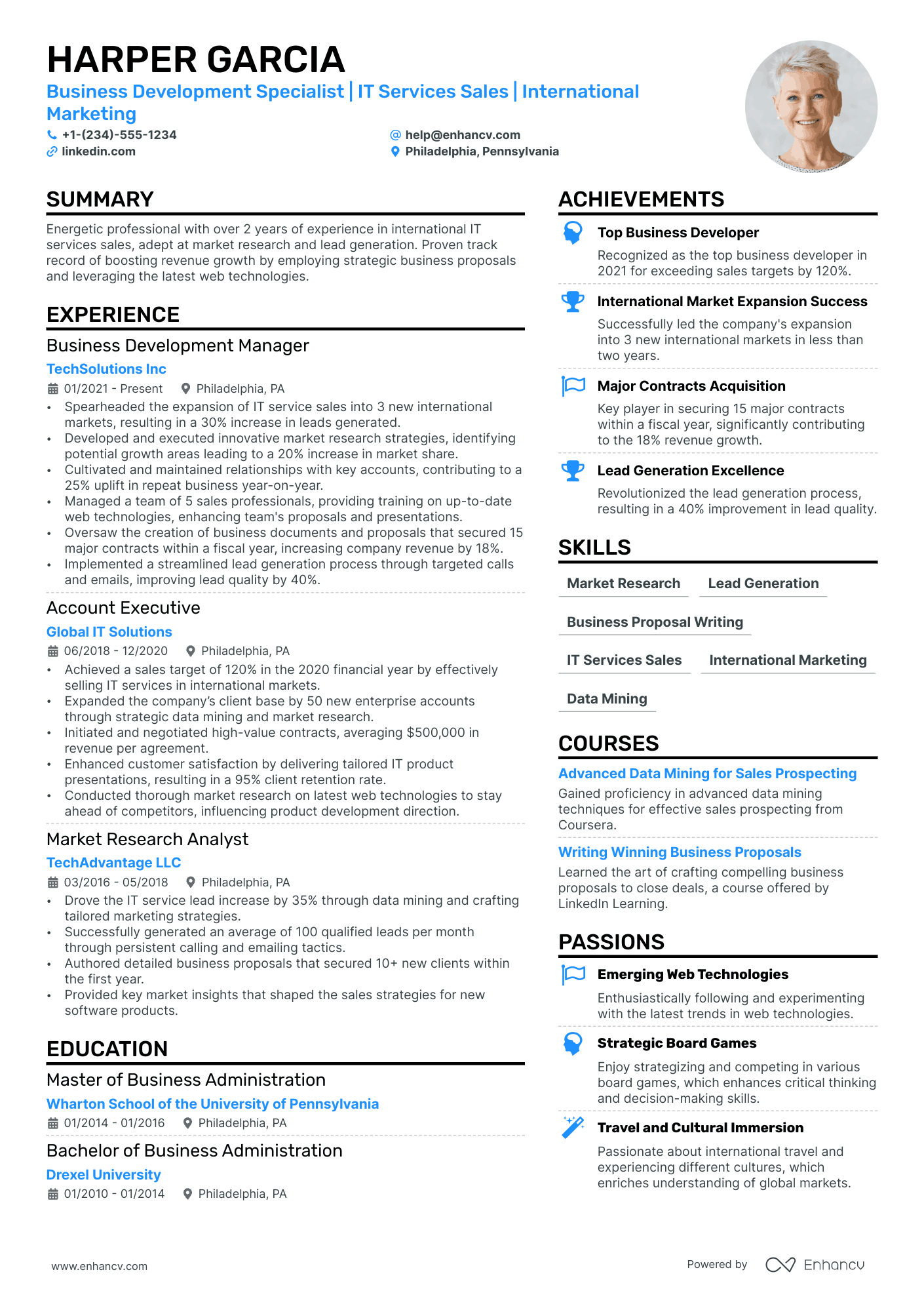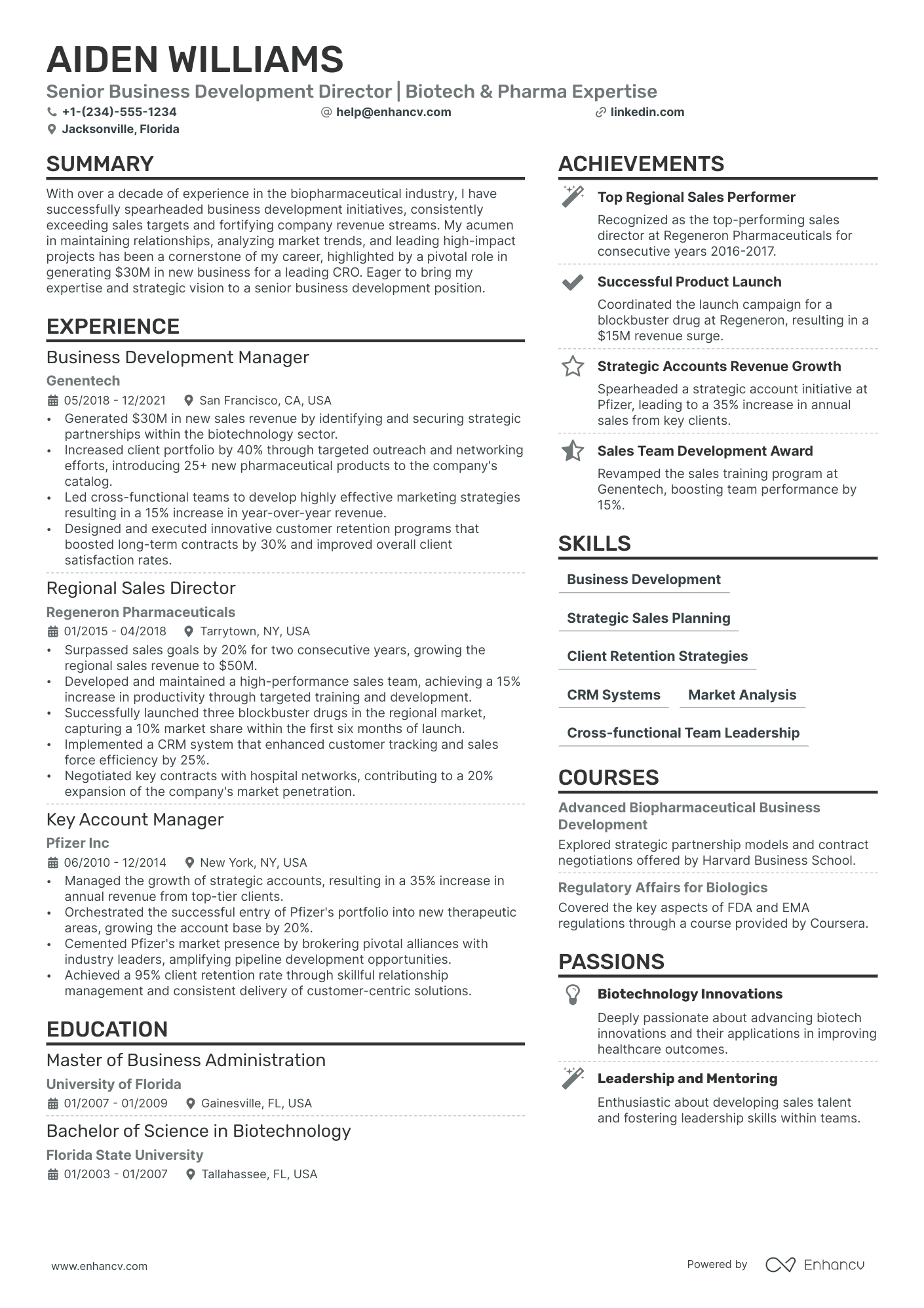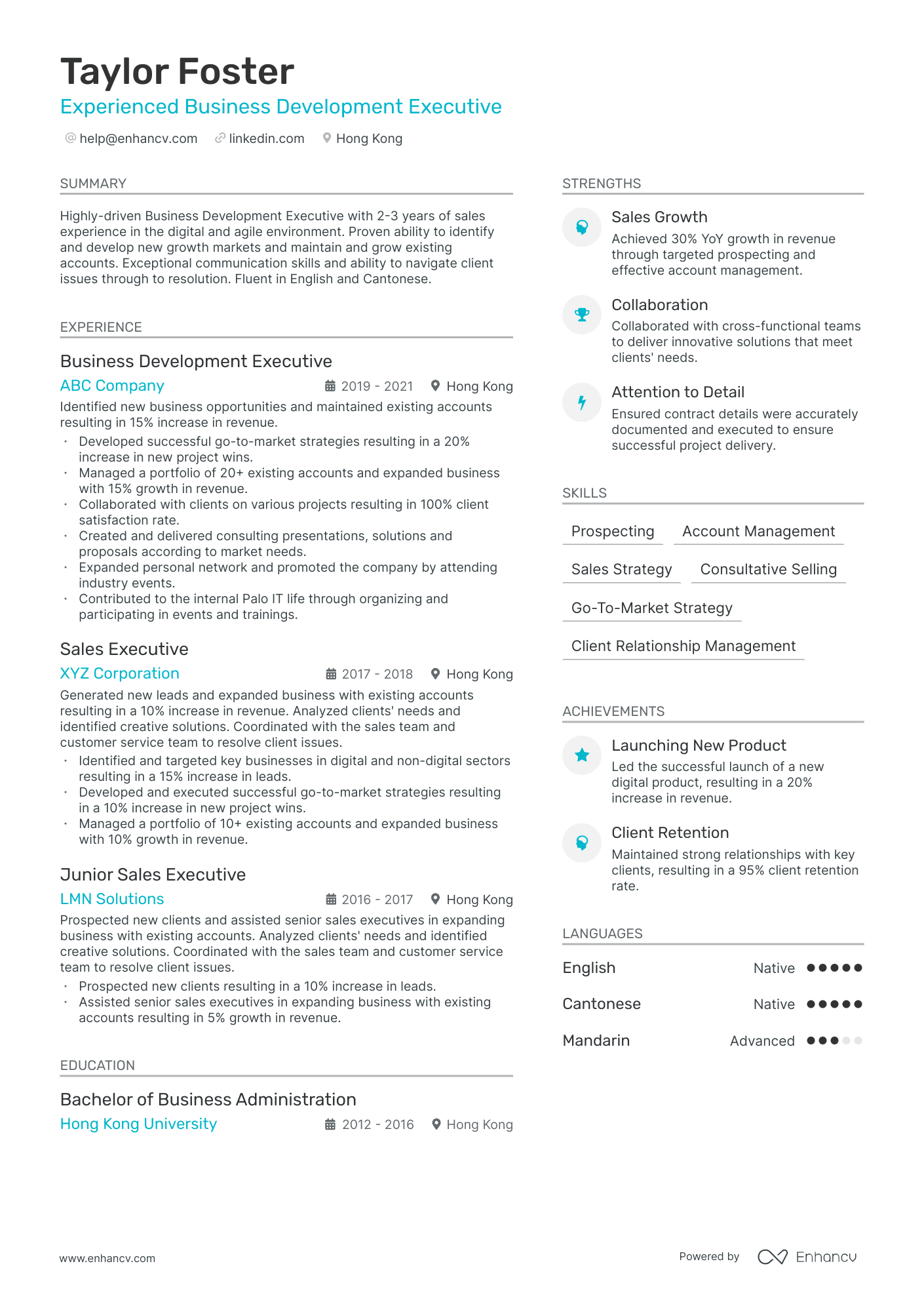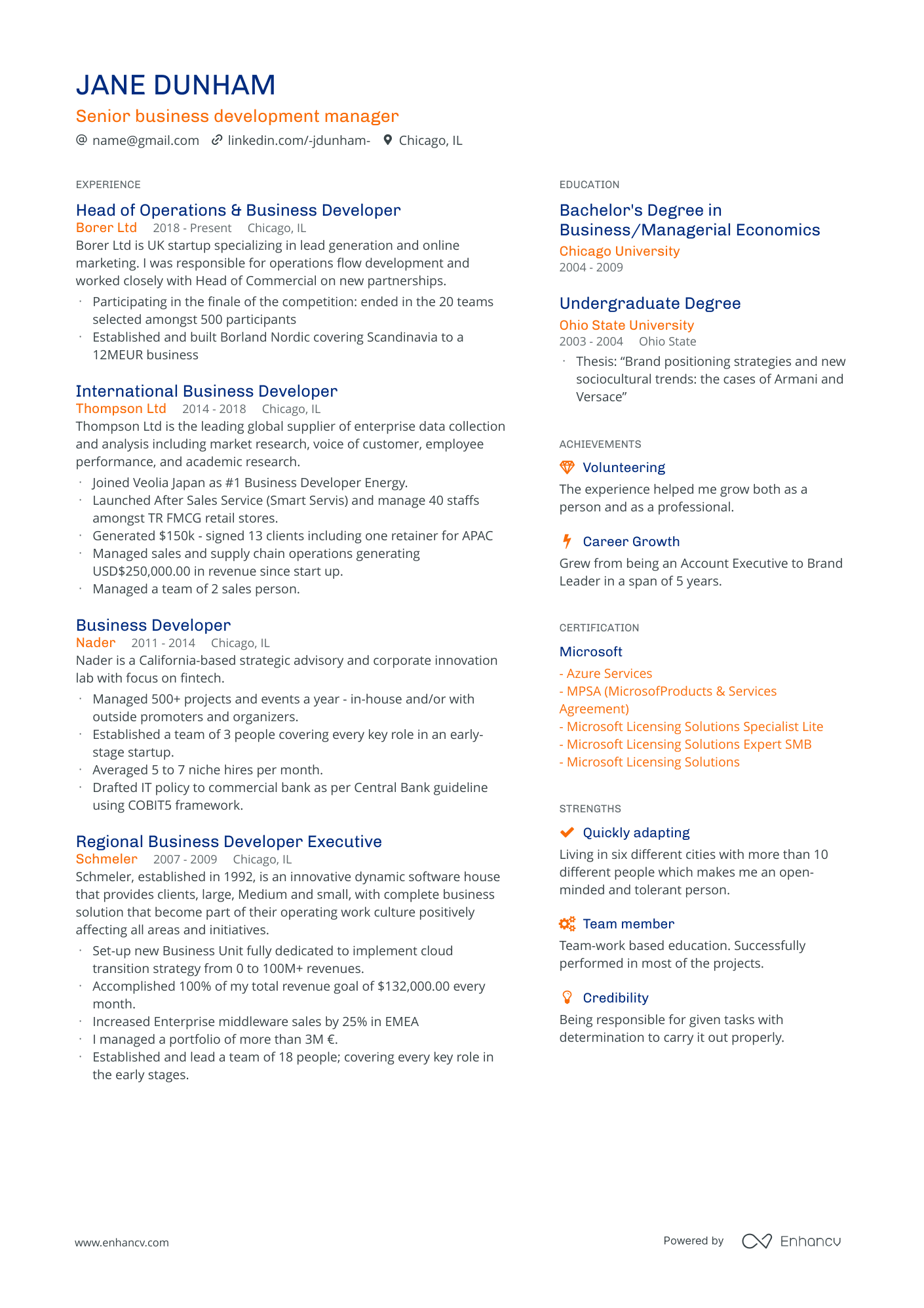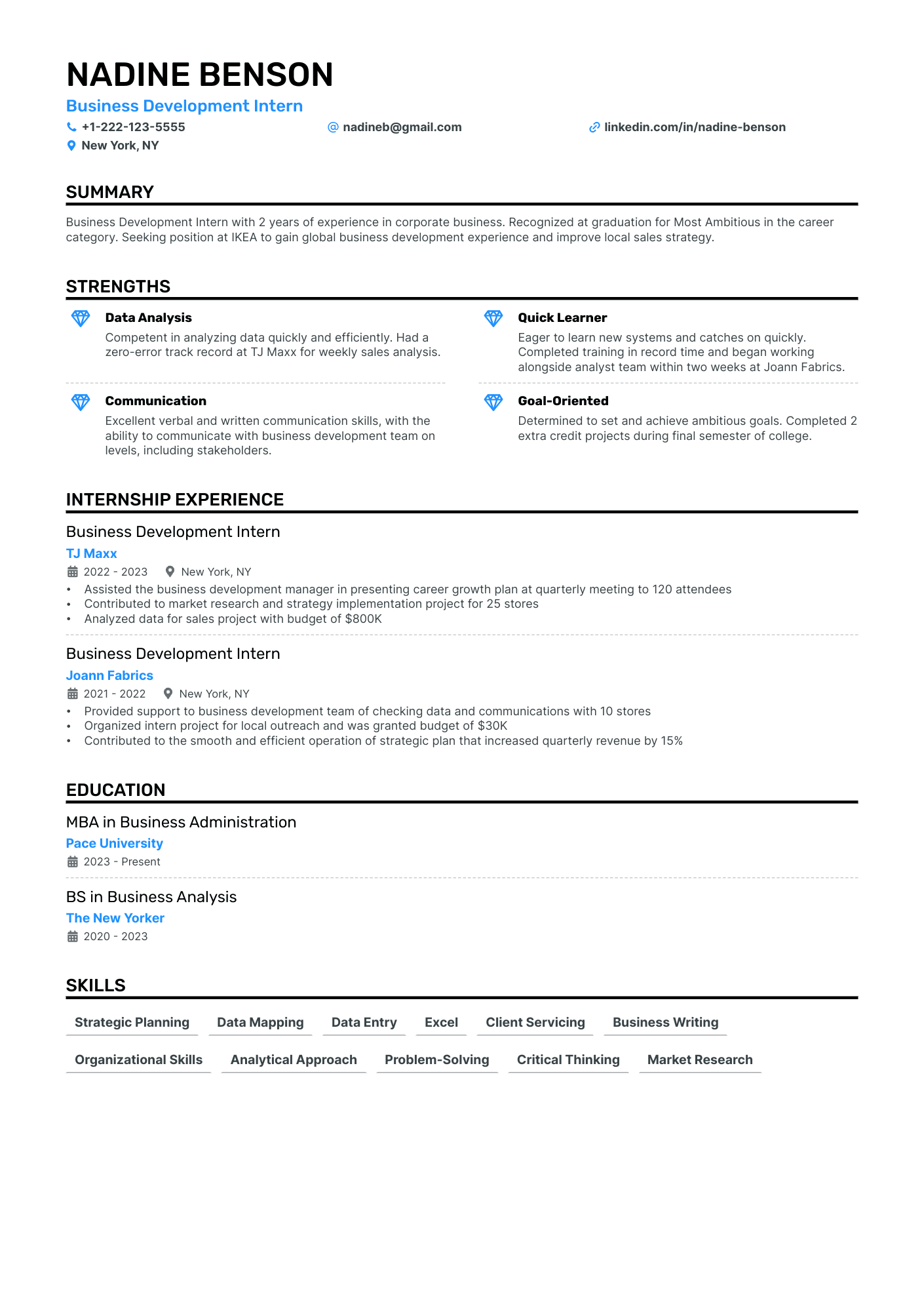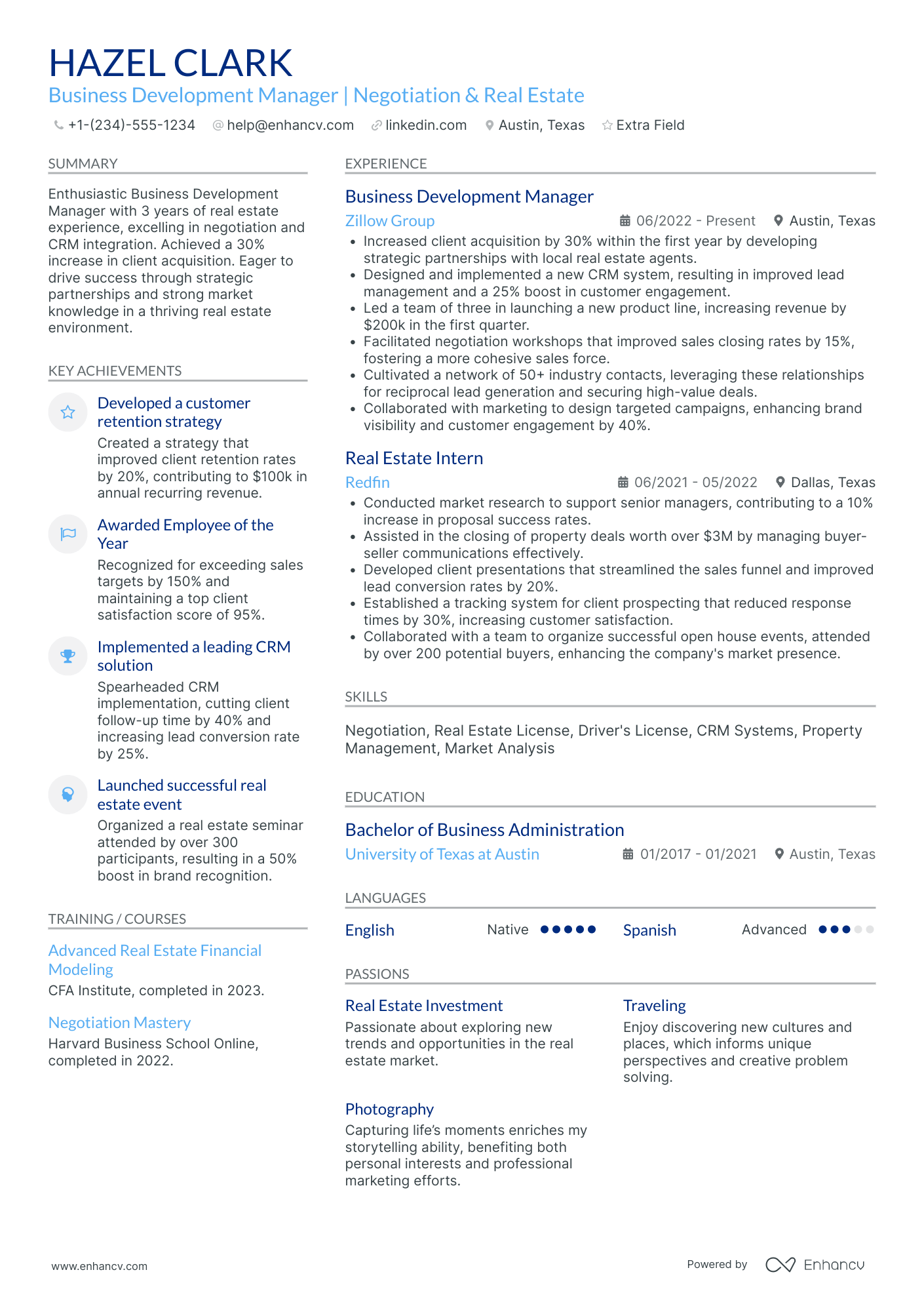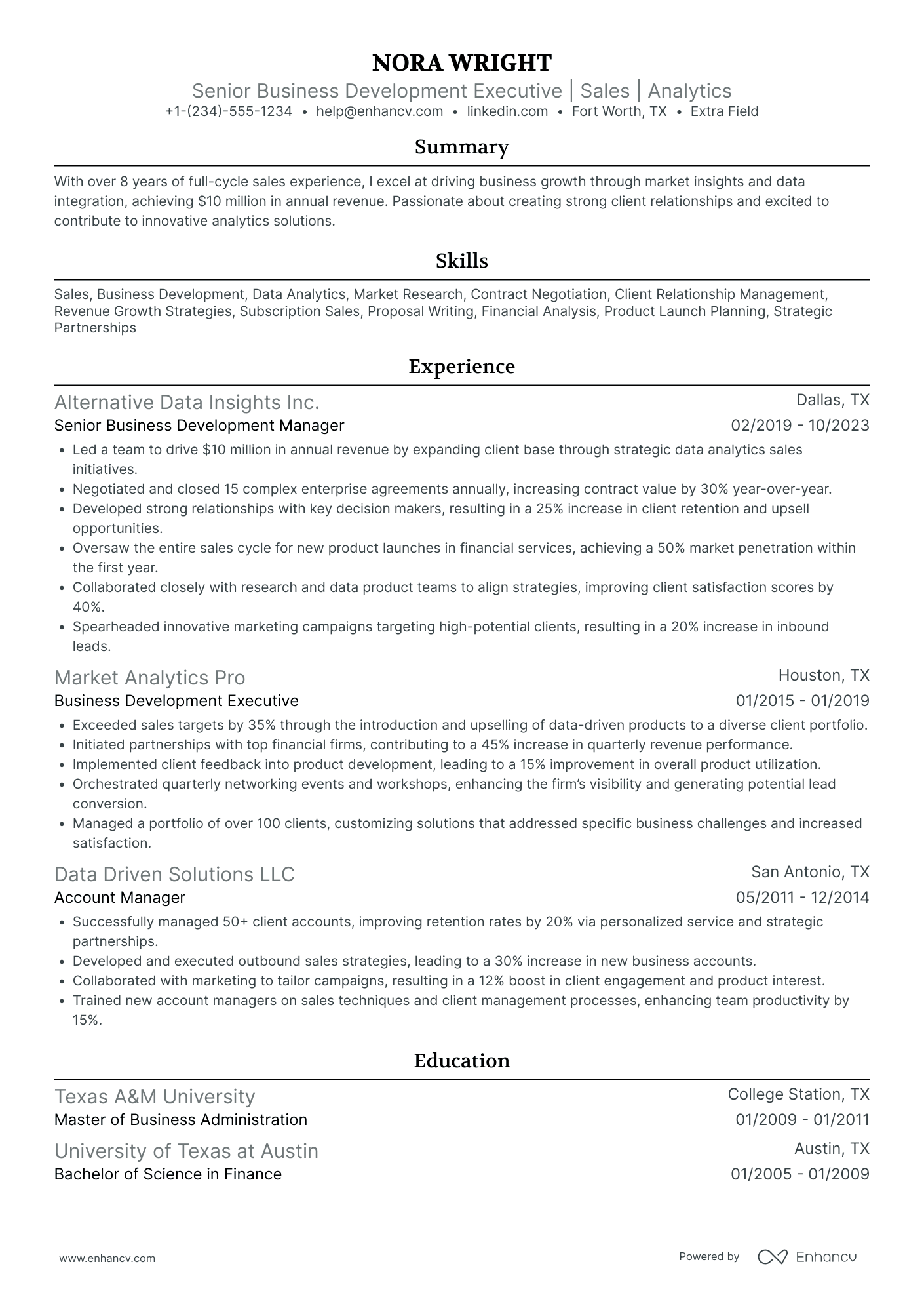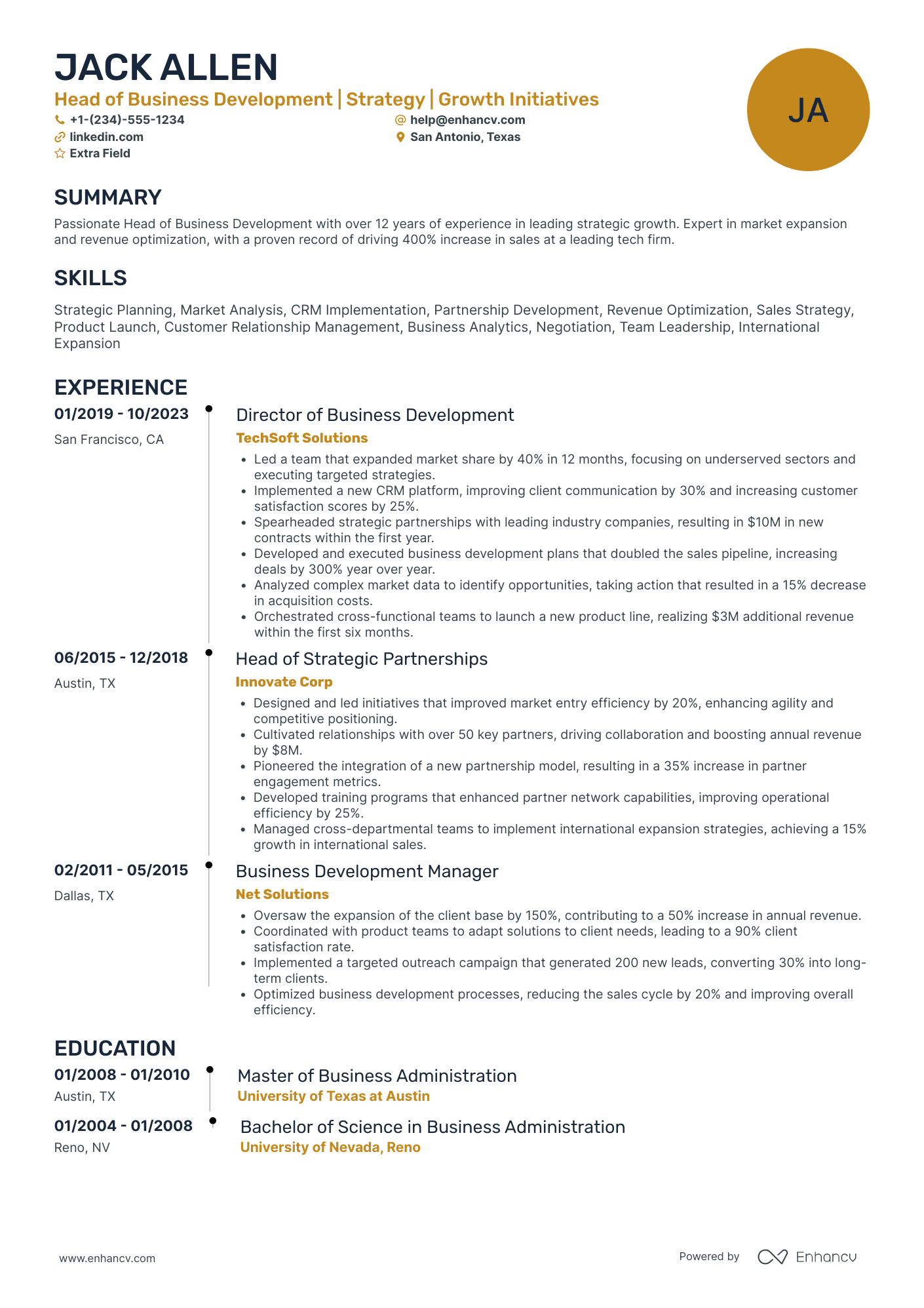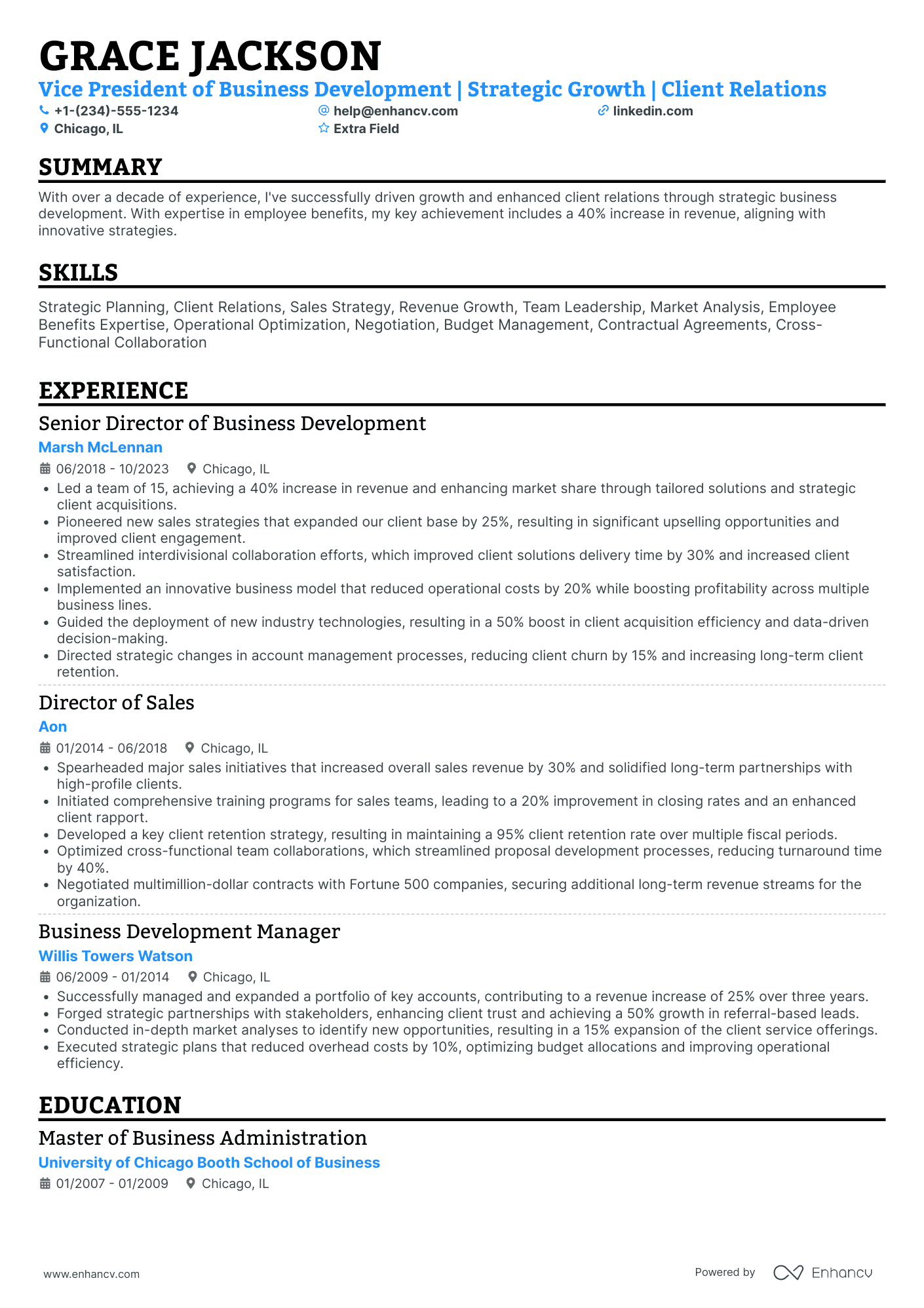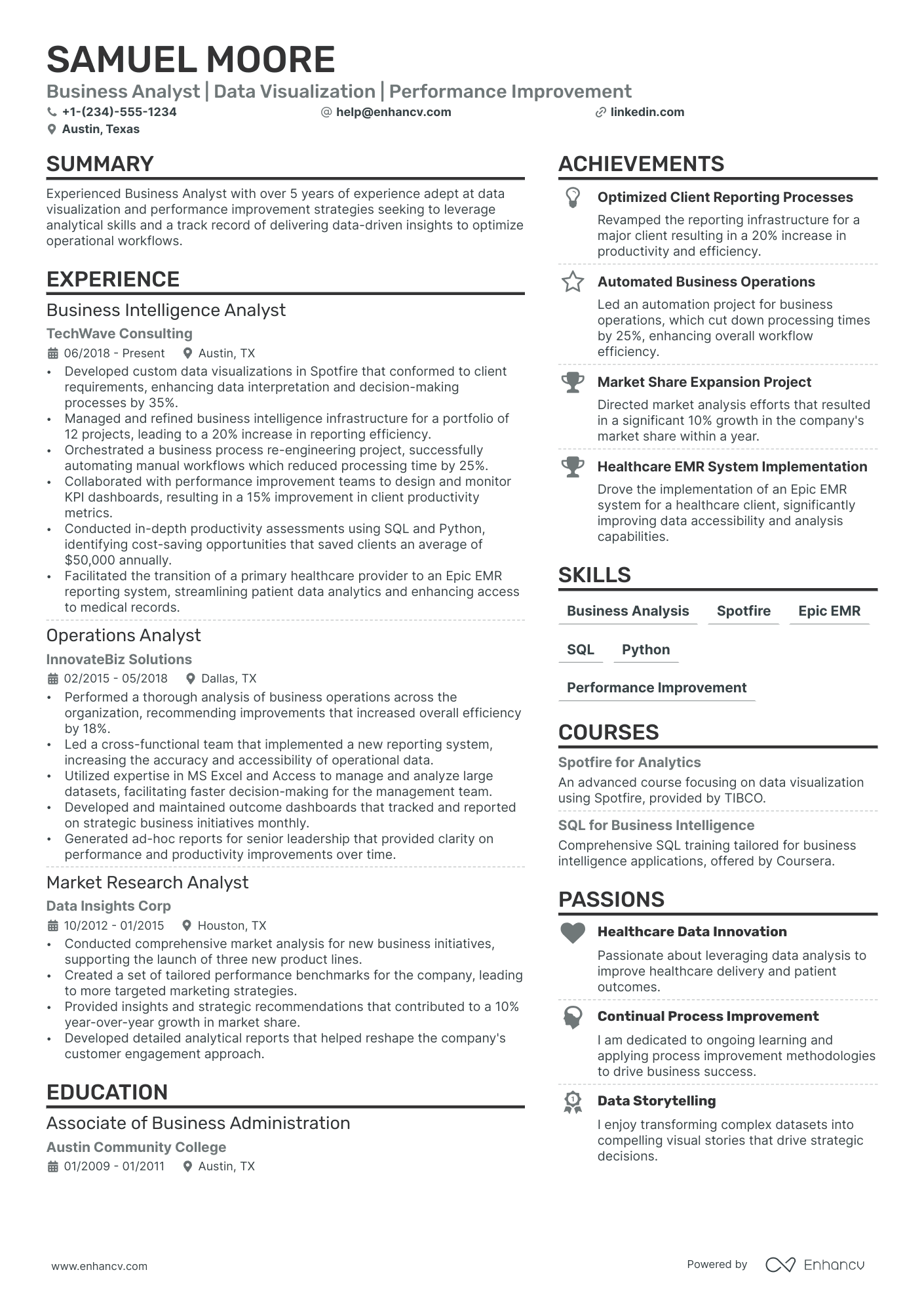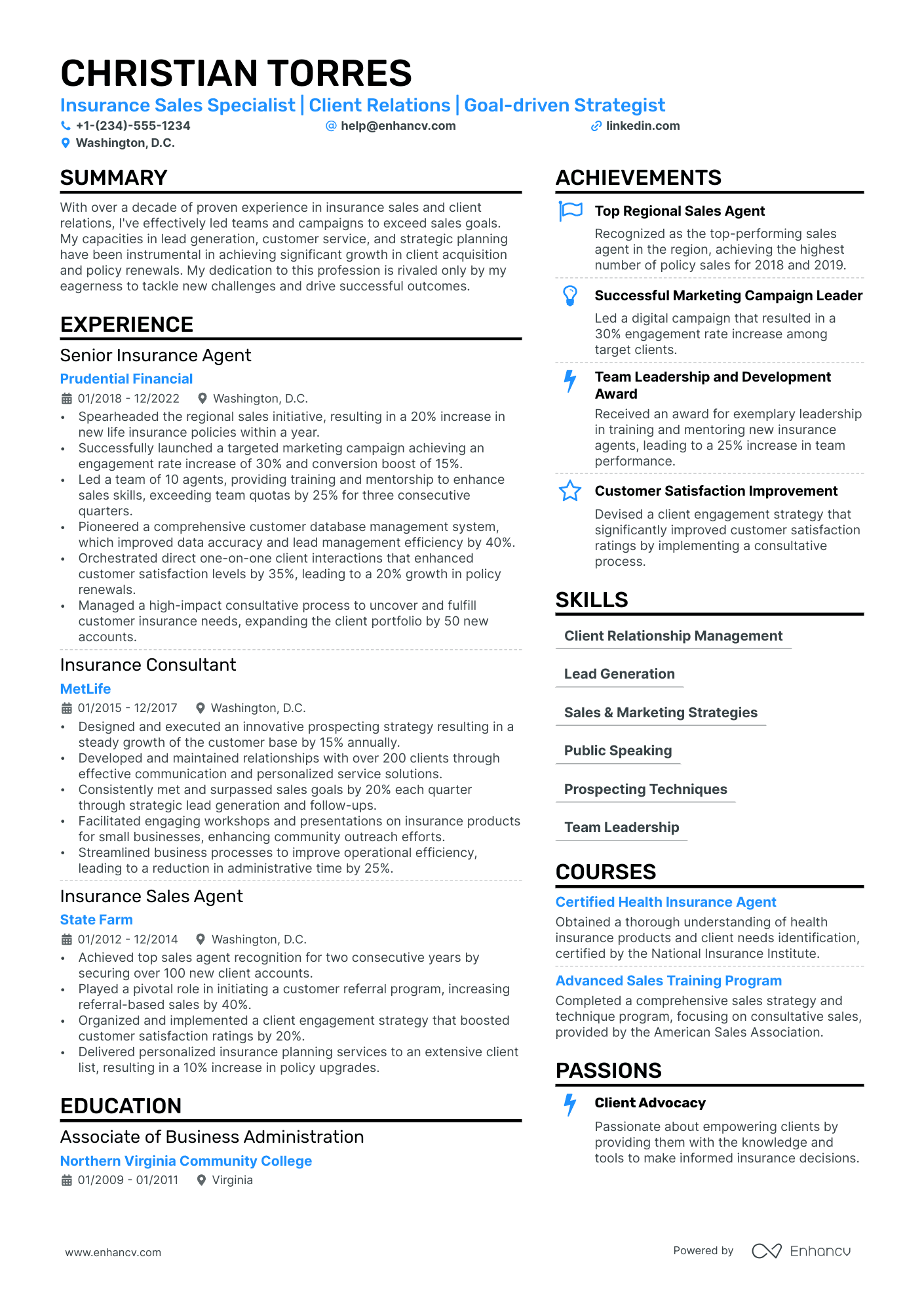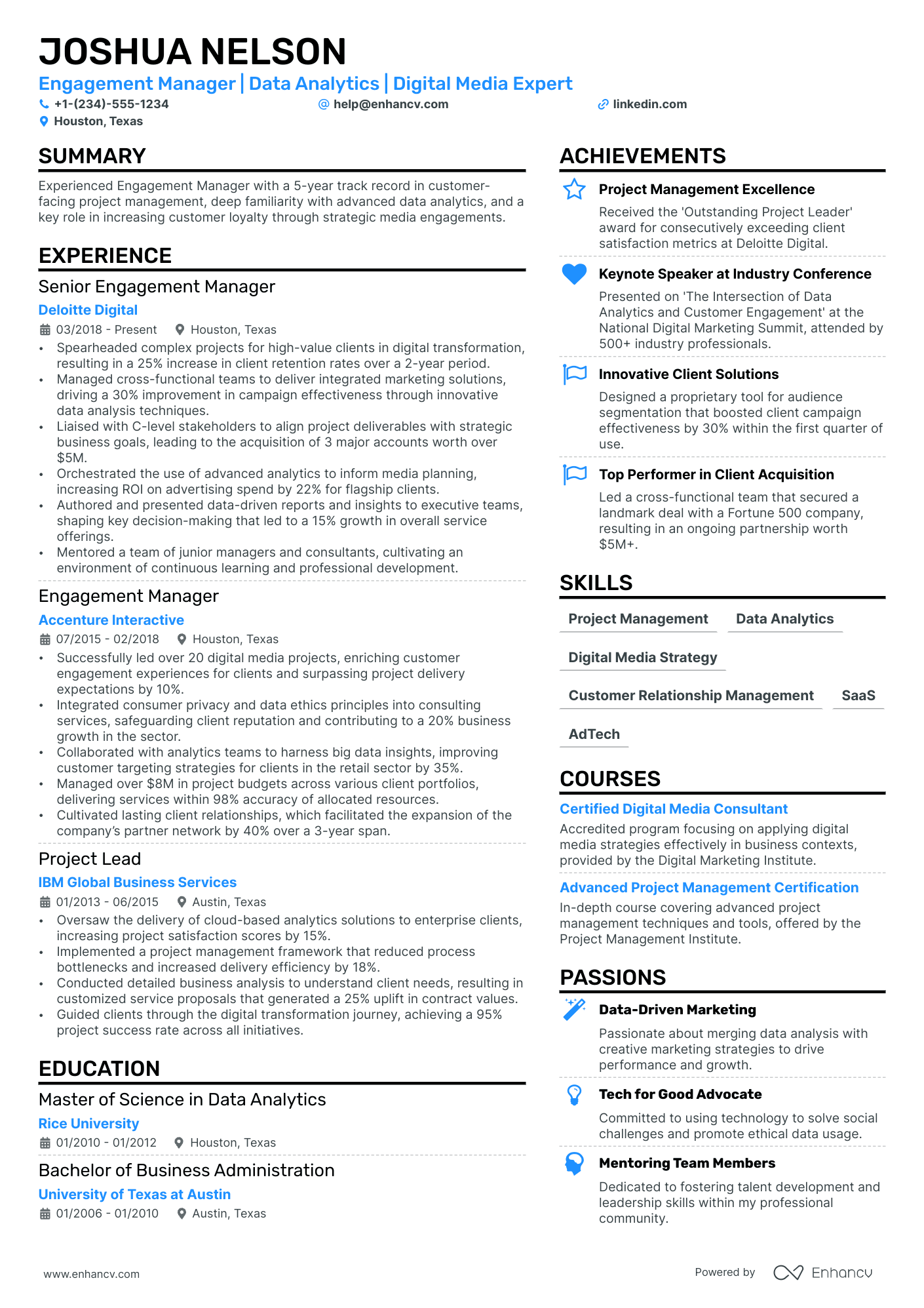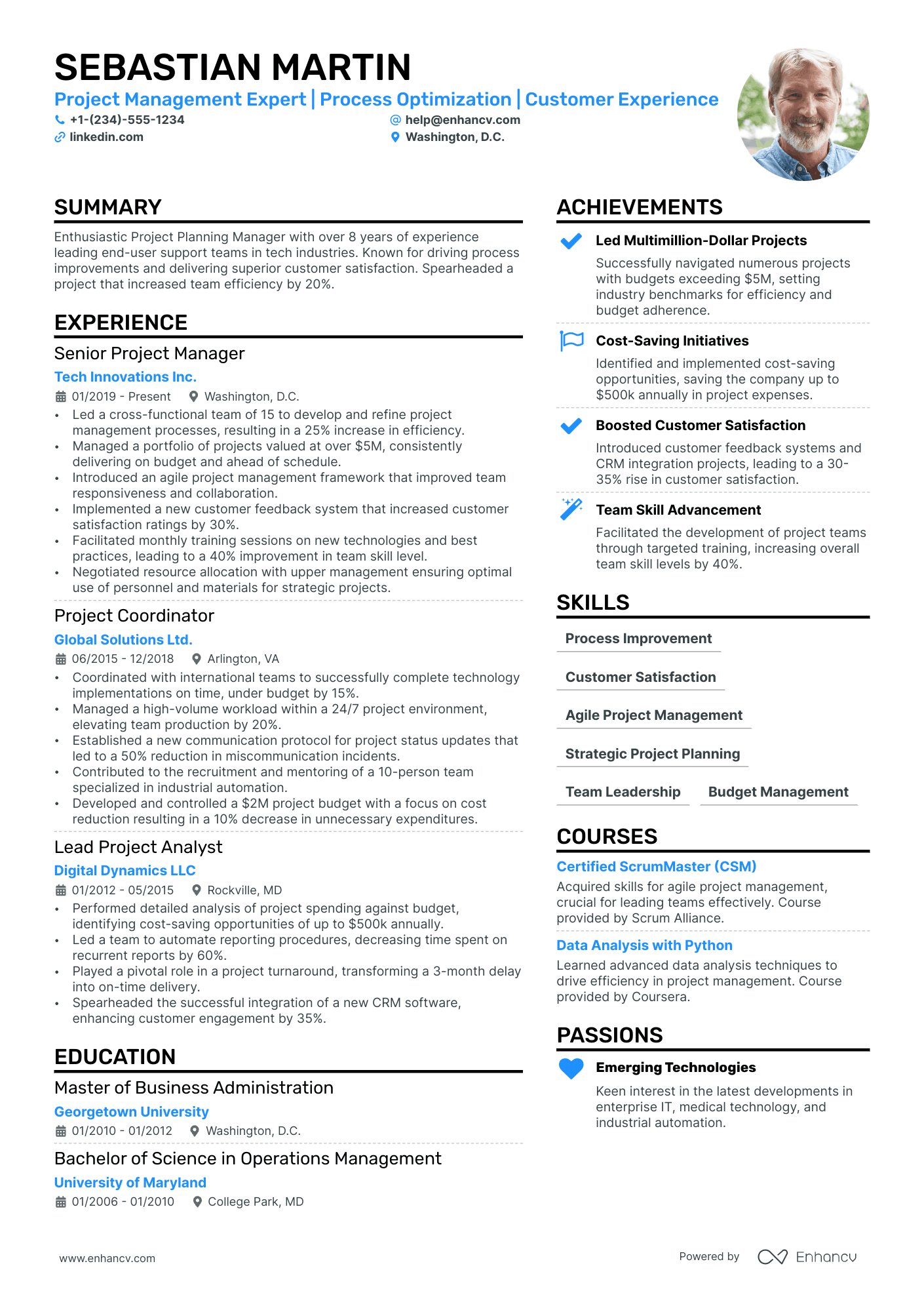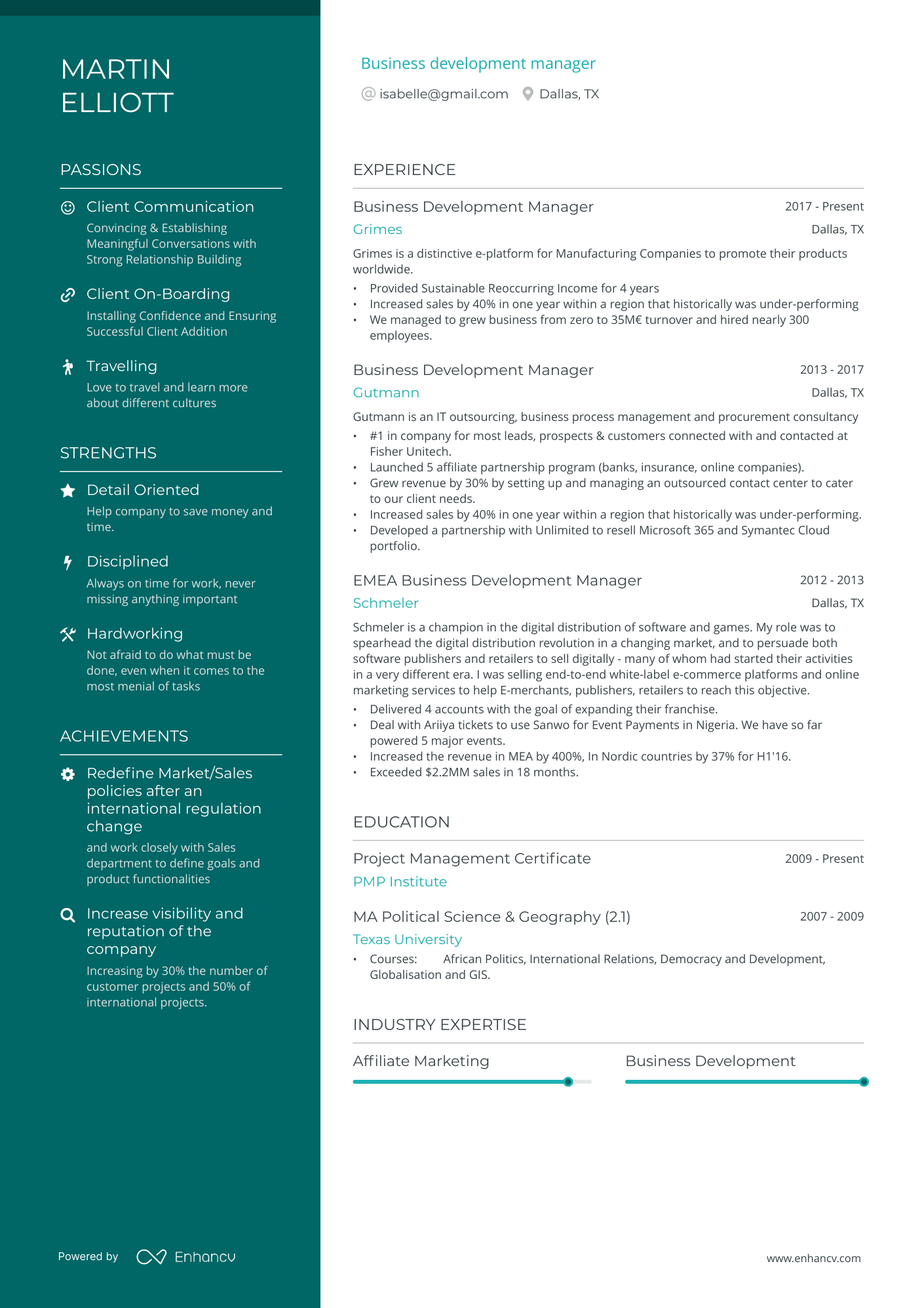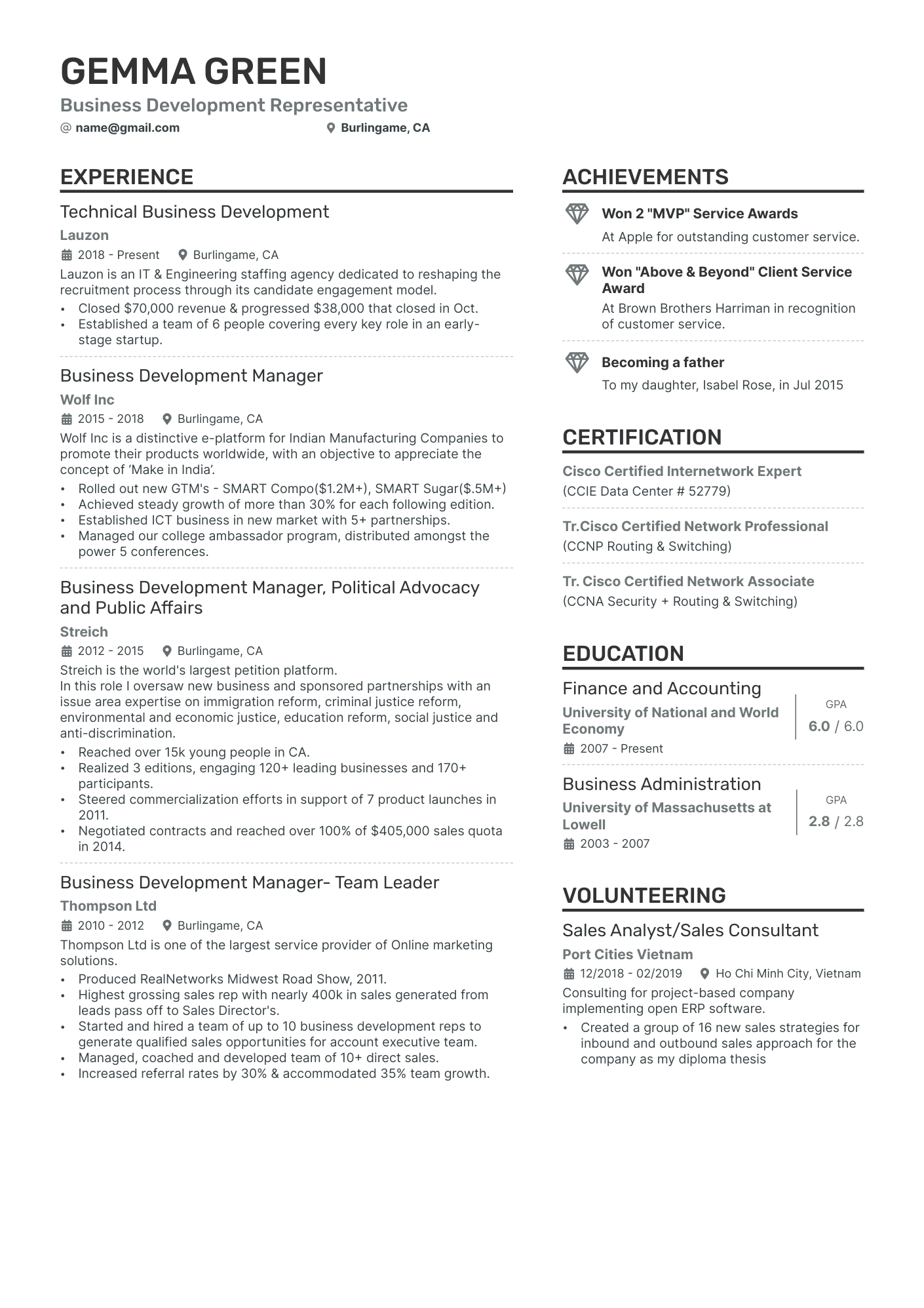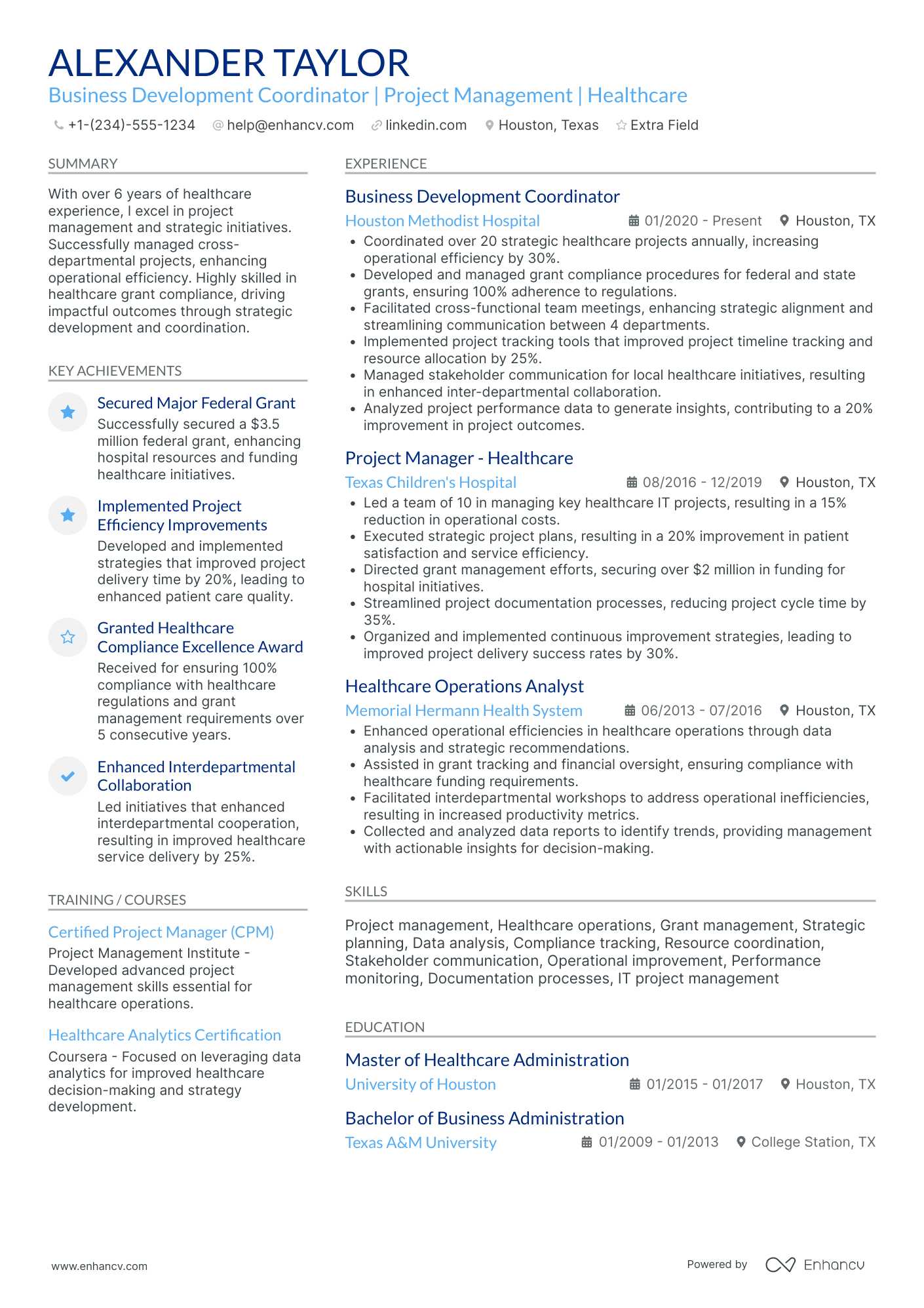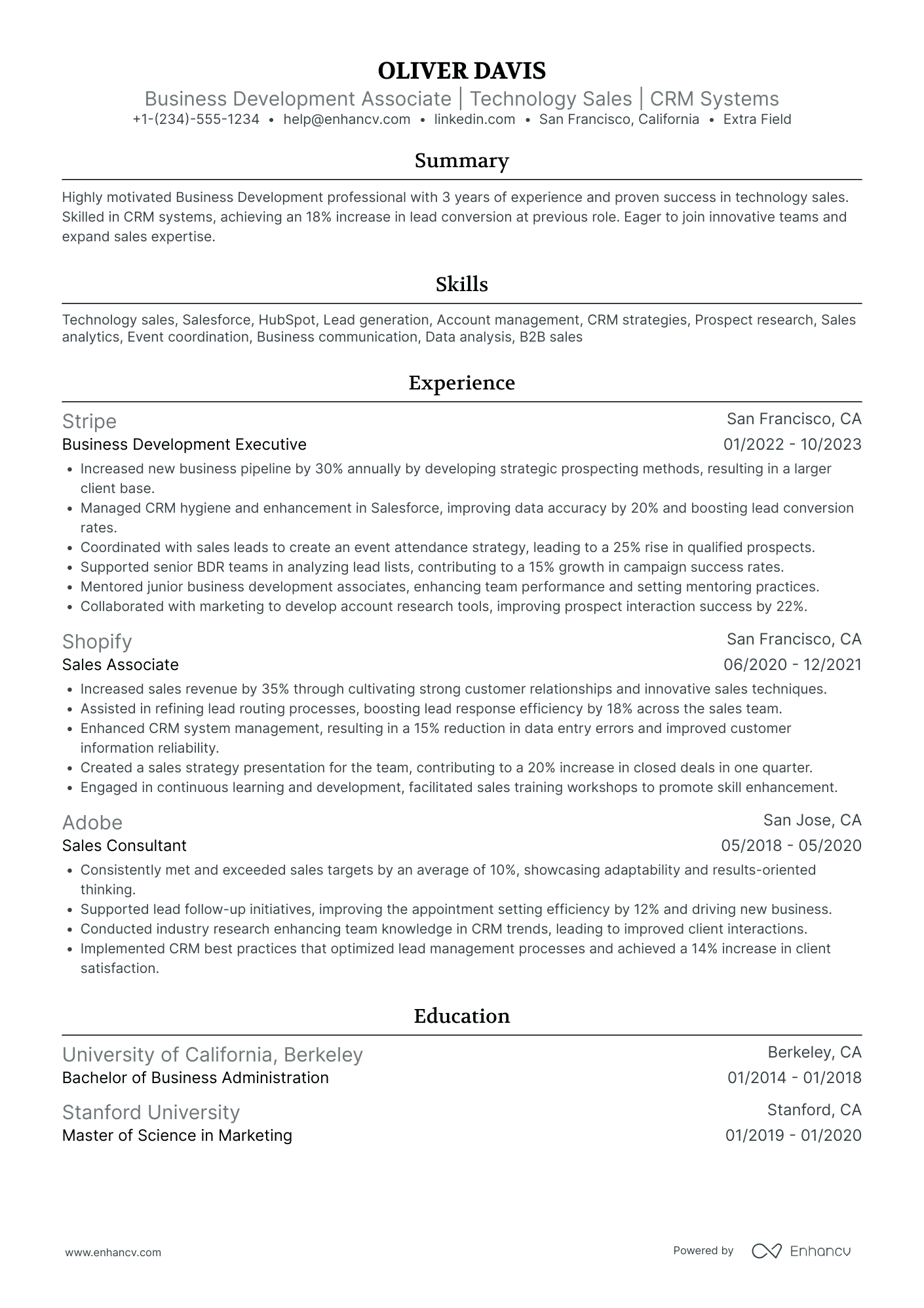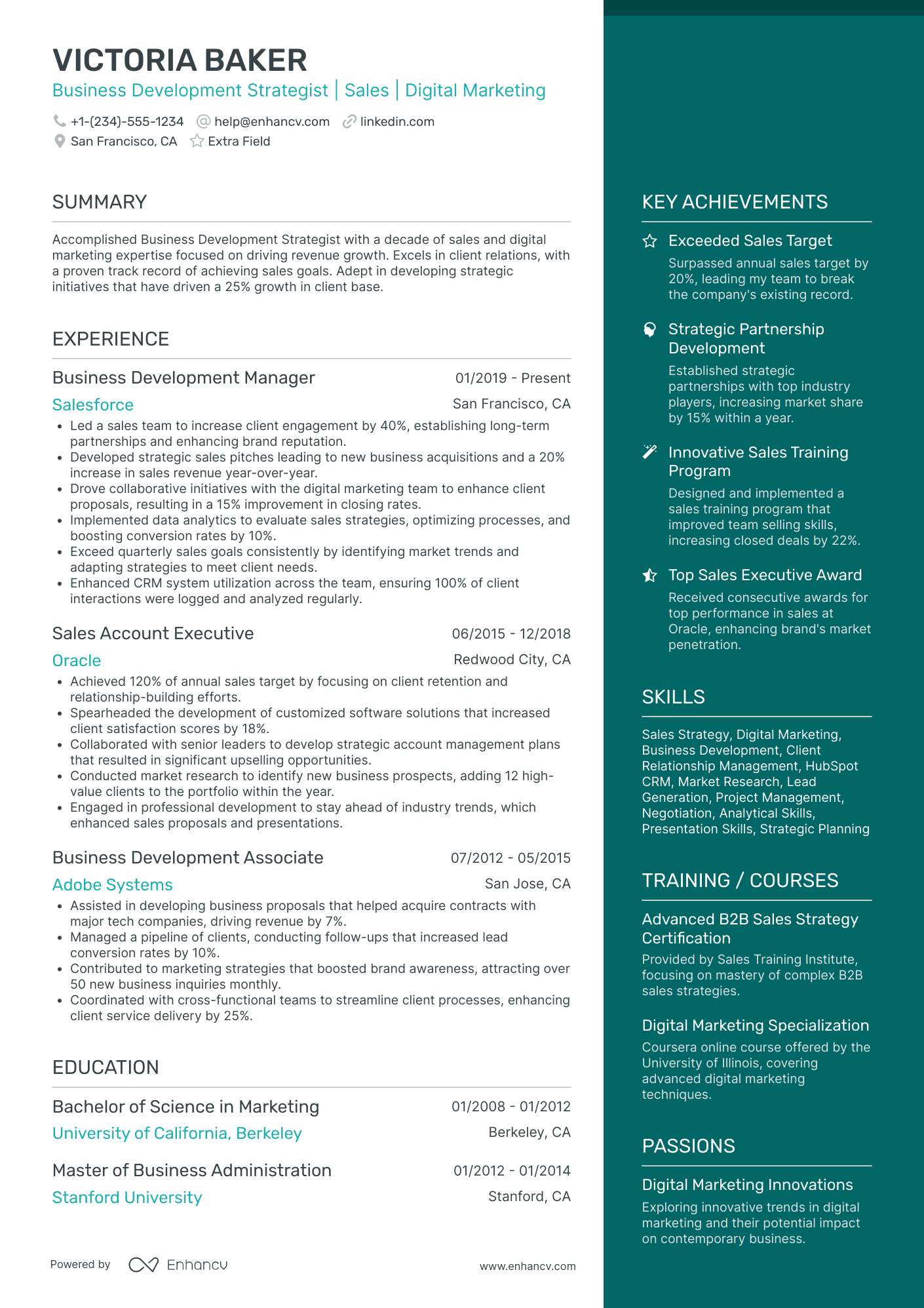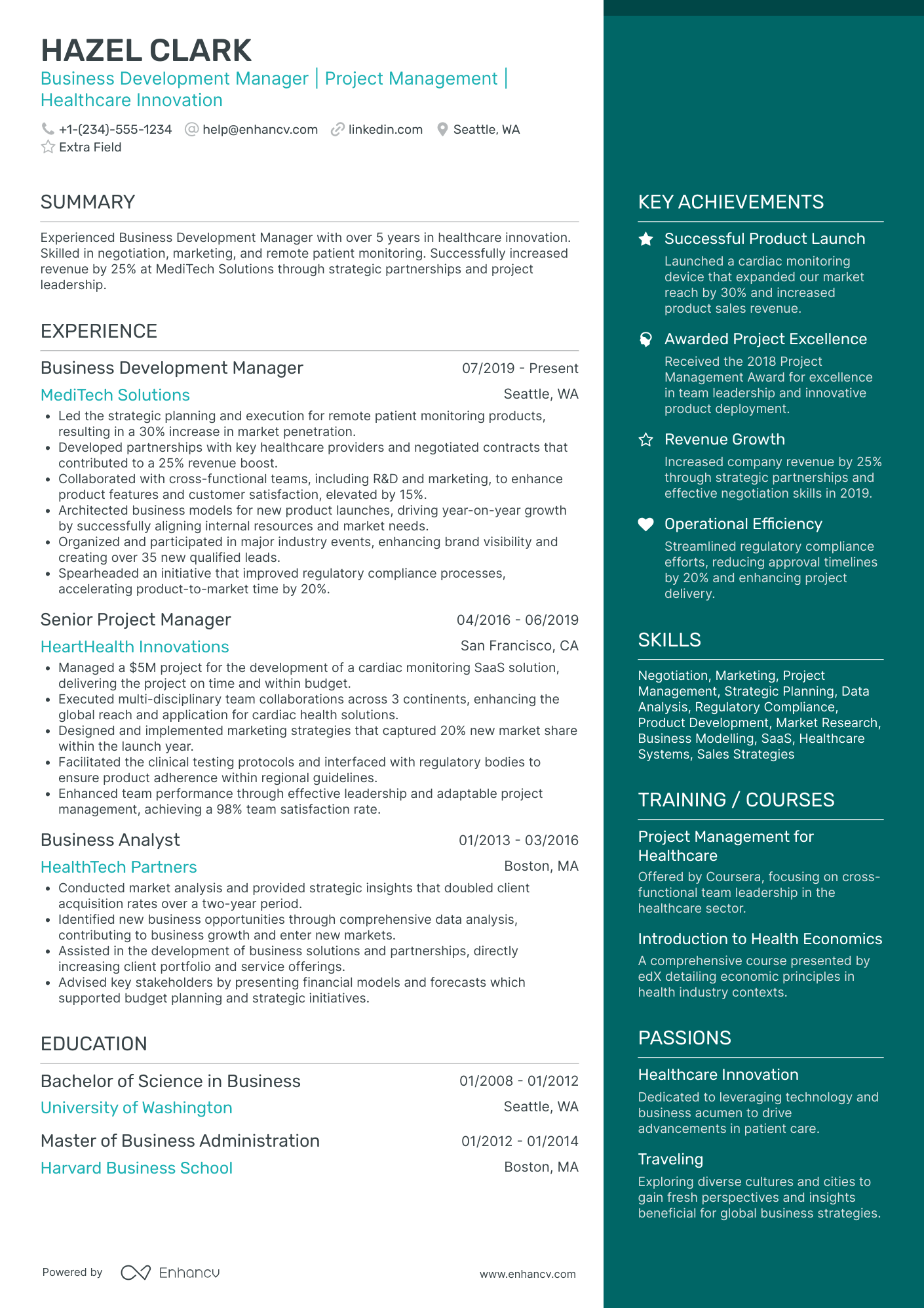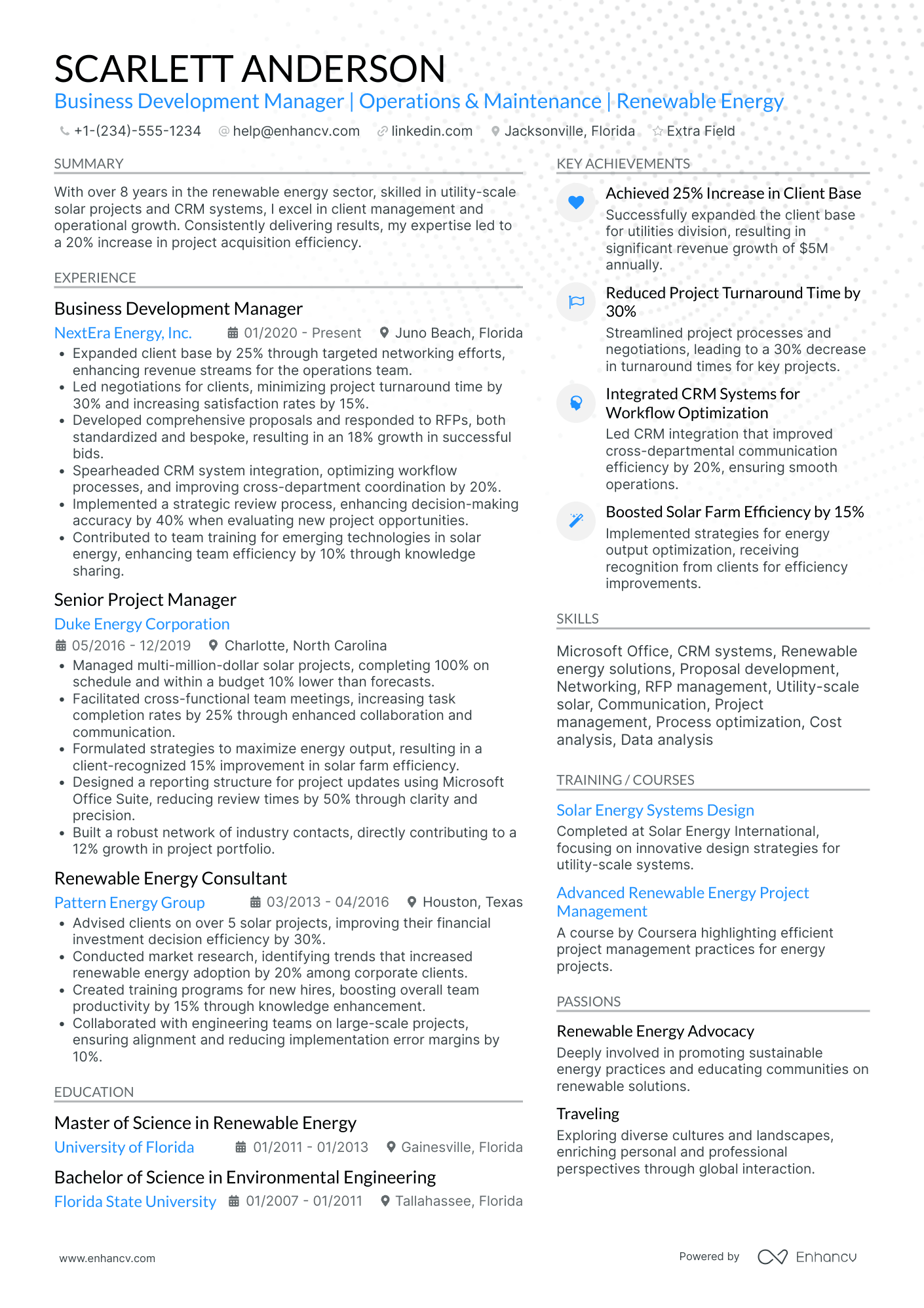Business development is often seen as a relentless pursuit marked by competitive strategies. However, excelling in this field requires a versatile array of qualities. These include creativity and empathy, which are essential for building meaningful connections. Creativity, in particular, is a critical driver of business success. A survey found that nearly 90% of high-growth companies recognize creativity's importance for long-term success.
A successful business development resume should effectively present these attributes. It's not just about listing achievements. What’s important is demonstrating the ability to think outside the box, deeply understand client needs, and build lasting relationships. Our guide will help you craft a resume that highlights your unique blend of skills, ensuring your story captures recruiters' attention. Let's make your professional story as engaging and impactful as your daily work.
In this guide, we’ll cover:
- Formatting your resume for clarity and professionalism
- Emphasizing relevant achievements and skills that align with employer expectations.
- Adapting your resume to match job descriptions by including key phrases and terms from the posting.
- Essential industry-specific and soft skills, and how to list them on your business development resume
- Strategically targeting your education section to enhance your chances of getting noticed
- Writing a personal statement that highlights your unique strengths and career goals
- Including additional sections to showcase your individuality
We’ve gathered a list of guides and cover letters related to business development that might be useful:
- Business development Analyst Resume Example
- Business development Consultant Resume Example
- Business development Executive Resume Example
- Director of business development Resume Example
- VP of business development Resume Example
- Sales Operations Manager Resume Example
- Sales and Marketing Resume Example
- Salesforce Project Manager Resume Example
- Marketing Manager Resume Example
- Growth Product Manager Resume Example
- Professional business development Cover Letter Examples
Business development manager resume sample
Check out this business developer manager resume sample. It contains all the needed key sections. Use it as a frame for your own resume. To boost your application, you can also benefit from the Enhancv resume builder!
Kate Greene
business development Manager
kate.greene@enhancv.com | LinkedIn | San Francisco, CA
Summary
Results-driven business development Manager with over 8 years of experience in enhancing brand recognition and financial growth. Expertise in collaborating with executives, sales, and marketing teams to review market trends and propose innovative business strategies. Proven ability to identify new business opportunities, negotiate contracts, and foster strong client relationships.
Experience
Senior business development Manager
FutureVision Inc., San Francisco, CA
March 2020 – Present
- Led market research initiatives, identifying new revenue streams that increased annual sales by 25%.
- Developed and executed strategic business plans in coordination with cross-functional teams.
- Analyzed competitive market data to inform business strategies and product development.
- Presented comprehensive reports and actionable recommendations to senior management.
Business development Manager
Growth Solutions LLC, San Francisco, CA
July 2015 – February 2020
- Directed a team of 10 in creating and implementing business strategies, enhancing company visibility and profitability.
- Negotiated contracts with key clients, resulting in a 40% expansion of the client base.
- Conducted detailed market analysis to identify trends and opportunities.
- Worked closely with marketing and sales departments to align strategies and achieve business objectives.
Assistant business development Manager
BrightPath Co., San Francisco, CA
June 2012 – June 2015
- Assisted in the creation of business proposals and presentations for prospective clients.
- Conducted SWOT analysis to support strategic planning efforts.
- Monitored market trends and competitor activities to provide actionable insights.
- Supported senior managers in identifying and evaluating new business opportunities.
Education
Master of Business Administration (MBA)
Stanford University, Stanford, CA
Graduated: June 2012
Bachelor of Science in Business Administration
University of California, Berkeley, CA
Graduated: May 2010
Certifications
- Certified Business Analysis Professional (CBAP)
- Strategic Planning and business development Certification
Skills
- Market Research and Analysis
- Strategic Planning and Implementation
- Client Relationship Management
- Financial Analysis and Modeling
- Competitive Analysis
- Contract Negotiation
- Data-Driven Decision Making
- Team Leadership and Development
Languages
- English (Native)
- Spanish (Fluent)
Now let’s get into more detail on the formatting of your resume.
How to format a business development resume
What makes a good resume that serves as a stepping point for showing off your skills and experience? From format to ATS compatibility, we’ve got you covered with these few key tips on formatting:
- Resume format: For most business developer roles, the traditional reverse-chronological format works best. It lists your experiences starting with the most recent. This tells a cohesive story of what you’ve done so far, and how you’ve developed as a professional. It’s a way for recruiters to grasp the essence of your work history.
- Colors on a resume: Don’t be shy about a little color on your resume. Use elegant colors to focus recruiters’ attention on your strengths. Pick a primary and a secondary color. Think about what you want the recruiter to notice first and pick a primary color for it, then secondary for additional info. You could also include an accent color to make your resume more visually appealing. Use this in elements such as your job title, profile or portfolio links, university name, etc. Just remember: your colors shouldn’t fight each other for the attention of the recruiters.
- Which font to choose: Opt for modern classics like Rubik, Lato, or Calibri. Arial’s also a classic and a good choice for a serious role in business development.
- Resume length and margins: For most professionals, a 1-page resume is enough for a good overview of their achievements. A 2-page resume is an option if you have extensive experience (>5 years) but always strive for conciseness. Recruiters have limited time to look at your resume. To save space, you can also use a two-column format. ATS (Applicant Tracking Systems) have no problem reading it. As for margins, 1” on each side is recommended. Our resume builder can come in handy here: it ensures your margins are never <0.5”.
- Header, contact info, and photo: A straightforward header that includes your name, job title, and contact information is paramount to your resume. Plus, all essential info in one place will be greatly appreciated by recruiters. Generally, skip the photo, but do consult the specific job posting.
- File formatting Now that you’ve put your unique resume layout in place, you want to keep it in place. And a PDF format does the trick. Bonus: it is perfectly readable by ATS.
You’ve got the frame, but what about the contents? We’re going to dive into this in a second, but let’s review the top sections your resume should include:
- Professional summary
- Work experience
- Skills
- Education
- Achievements and certifications
We’ll cover them in detail below.
Ready for an interview? Try out our ATS Resume Scanner!
Your resume should match the market – Canadian applications, for instance, may use a different layout.
Is your resume good enough?
Drop your resume here or choose a file. PDF & DOCX only. Max 2MB file size.
Let’s start with the most crucial part of your resume – your experience.
How to write your business development experience
As a business developer, you’d carefully curate your partnerships. Similarly, make sure you’re selective about what you include on your resume. Your experience section should focus on your relevant experience.
Here are some ideas on what to include on your business development resume:
- Revenue growth: Demonstrate your ability to drive revenue growth through strategic business development initiatives.
- Client acquisition: Successfully acquired and managed key client accounts, leading to significant sales increases? Write it down!
- Market expansion: If you’ve contributed to company expansion by probing new market segments, definitely list that on your resume.
- Partnership development: Established and maintained strategic partnerships, enhancing the company’s market position.
- Sales strategy: Implemented effective sales strategies that resulted in measurable growth and competitive advantage.
- Market analysis: Conducted comprehensive market research to identify trends and opportunities for growth.
Business developers will also highly benefit from including tangible examples of their impact. Think of how you contributed to your workplace(s) but make sure the measurable impact you mention serves to make a point, not just empty numbers. An example would be, “Expertly negotiated partnership agreements and upselling strategies, boosting average deal size by 40%.”
Tailoring your resume to the job description is integral to your success. As we mentioned earlier, recruiters don’t have much time to spend on your resume – as awesome as it is. On average, the first scan takes 6 seconds, so make sure you match your application to the exact job description. That’s like crossing off items on a checklist. The recruiters’ checklist, that is!
Let’s put this idea into action. Look at the responsibilities and requirements from this real-life job business development manager job description.
Business development Manager
Requirements:
- Proven business development experience
- Strong commercial and negotiation skills with experience in financial modeling
- Experience negotiating contracts, interpreting legal documents, and completing agreements with attorneys
- Strong communication & storytelling abilities, proficient in executive communication internally and externally
- Keen sense for prioritization, both internally and externally with partners
- Ability to identify when it is right for Calm to decline a partnership
Responsibilities:
- Develop, negotiate, close, and manage strategic agreements supporting Calm’s mission and growth
- Report to the Head of Partnerships (Americas) and collaborate cross-functionally with Legal, Marketing, Product, and other teams to launch and manage partnerships
- Source and manage a pipeline of prospective partnerships
- Identify, negotiate, manage, and renew strategic deals with partners
- Build relationships and credibility within partner organizations
- Identify new opportunities to grow partnerships and unlock additional value for both Calm and partners
- Act as the primary point of contact for partners’ needs, defining and executing on long-term partner relationships
- Ensure commitments in partner relationships are delivered by both Calm and partners (e.g., marketing, reporting)
- Drive positive-sum outcomes and navigate internal and external dynamics toward optimal results
- Lead cross-functional teams towards achieving deal objectives (Legal, Marketing, Content, Product, etc.)
Here’s a well-written experience section that targets that same job description:
- •Negotiated and closed 15 strategic partnerships with major health and wellness organizations, increasing app user base by 40%.
- •Managed a pipeline of 50+ potential partnerships, evaluating opportunities and prioritizing high-impact collaborations.
- •Developed and implemented partnership renewal strategies, resulting in a 90% renewal rate and $5M in annual revenue.
This experience section will impress recruiters:
- Quantifiable achievements: The example includes specific metrics such as increasing the app user base by 40% and achieving a 90% partnership renewal rate, demonstrating tangible results.
- Relevant responsibilities: It clearly outlines responsibilities such as negotiating partnerships, managing pipelines, and strategizing renewals, directly aligning with the job requirements of the business development Manager role.
- Impactful language: The use of action verbs like "led," "negotiated," "managed," and "developed" conveys leadership and proactive involvement in driving business growth through partnerships.
But what to do if you don’t have much experience – or none at all? We’ve done the research, so see our tips below.
How do I write a business development resume with no experience
Your starting point in the field will probably be a business development representative role. Your main responsibility will be prospecting and qualifying early-stage leads through cold calling and emailing. As a business development rep, you serve as the connection between marketing and sales. So, any relevant experience in those areas can be useful. The role is suitable for recent graduates as it offers a platform to apply theoretical knowledge in a practical setting, providing a fast-paced environment for rapid professional growth and learning.
In your entry-level resume, focus on some of the following to win recruiters over:
- Educational background: A bachelor’s degree in business, marketing, economics, or a related field provides foundational knowledge that can be directly applied to understanding market dynamics and business operations, which is crucial for identifying growth opportunities.
- Key skills: Strong communication helps in articulating value propositions to clients, while analytical skills enable the interpretation of market data to guide strategy; project management ensures initiatives are executed effectively, and networking abilities are critical for expanding business contacts and building partnerships.
- Relevant experience: Internships or part-time roles in business development, sales, or marketing equip candidates with practical insights into market needs and business processes, enhancing their ability to contribute effectively from the start.
- Sales experience: Beneficial for developing negotiation skills and an understanding of customer needs, which are essential for closing deals and fostering long-term relationships with clients.
- Certifications and training: Pursuing certifications like Certified business development Manager (CBDM) demonstrates a commitment to professional growth and expertise in business development strategies, which can distinguish candidates in competitive job markets.
- Transferable soft skills and traits: Think about what transferable skills you have that could help you with your dream position. These could include communication, strategic thinking, entrepreneurial spirit, and creativity.
- Resume objective: An engagingly written resume objective on your entry-level resume can open lots of doors for you. It’s the personal statement most appropriate for those just starting out in their career, as it focuses on your skills rather than experience. Keep it short and
After you’ve outlined your experience, the next step is to highlight the valuable skills you've developed.
Business development skills on your resume
Skills on your resume give hiring managers an understanding of what you can do. And although a list of your abilities comes in handy, consider providing specific examples of how your skills expanded your potential and brought success in your roles.
Here’s an example of how your confidence brings success:
Confidently presented a comprehensive market research analysis, highlighting accurate consumer trends and their implications for product development. Successfully convinced management to invest in recommended product modifications based on detailed insights.
Your skills can be categorized into two categories: industry-specific and people skills.
Industry-specific, or hard skills, are abilities that can be easily tested and measured. You can prove you’re adept at a hard skill by providing specific metrics or certifications. Precisely because they’re easier to “check”, only list those skills that you feel fully confident in. Never lie on your resume, as this will hurt your relationship with your future employer.
List your hard skills in your experience, education, and achievements section. You can also organize them into a separate section to make them visible and accessible to recruiters. It’s great if your BDR resume summary or objective also includes 2 or 3 specific abilities mentioned in the job ad.
Here’s a list of the top hard skills for a business development role:
Best hard skills for your business development resume
- Sales forecasting
- Contract negotiation
- Proposal writing
- Business intelligence software
- CRM software
- Account management
- Market research
- Financial modeling
- Project management software
- Data analysis software
- Strategic planning
- Business case development
- Performance metrics
- Sales funnel management
- Pricing strategy
- Lead generation
- Multi-channel marketing
- Partner relations
- New business development
- Competitive analysis
- Event management and planning
- Business process management software
Your soft skills, on the other hand, can’t be measured as easily but they’re crucial because they show recruiters how you’d fit into the team and company culture. These are what make a difference because they show how you connect with people. That’s important for every role, and even more so as a business development representative. Strong communication and relationship-building skills are essential for effectively pitching ideas, negotiating deals, and maintaining long-term client relationships. Additionally, emotional intelligence and problem-solving abilities enable quick adaptation to challenges and foster a collaborative, innovative environment. These soft skills are crucial for driving business growth and success.
Check out this list of top soft skills for a business developer:
Best soft skills for your business development resume
Your educational background is where you’ve acquired some of those top-notch skills. Let’s see how to perfect the certifications and education section.
How to list your certifications and education on your resume
Your academic background and specialized knowledge developed your ability to drive business growth. A good education section provides potential employers with confidence in your capacity to analyze markets, negotiate deals, and strategically position the company for success. Moreover, educational achievements validate a business developer’s understanding of industry trends. Ultimately, this contributes to sustainable business expansion and profitability.
Your education section as a business developer should highlight qualifications that directly contribute to identifying new opportunities and driving growth strategies. For example, a Bachelor’s degree in Business Administration provides a strong foundation in market analysis and strategic planning. That’s essential for understanding market trends and competitor activities. Courses in Finance reflect skills crucial for making informed decisions in negotiations and partnerships. Certifications in Sales and Marketing demonstrate proficiency in client management and crafting compelling sales pitches. Each educational achievement proves your ability to grasp complex business dynamics and implement innovative strategies for organizational success.
Let’s look at a good business development education section:
- •Studied advanced negotiation strategies and financial modeling relevant to business development.
- •Developed strong executive communication skills crucial for effective stakeholder engagement and partnership building.
- •Gained insights into contract law and its implications in structuring and negotiating business agreements.
Here’s why it works:
- Relevance: The MBA from Stanford GSB underscores proficiency in negotiation, financial modeling, and executive communication—critical skills for business development roles.
- Credibility: Attending a top-tier institution like Stanford enhances credibility and suggests a strong academic foundation in business principles and strategy.
- Practical аpplication: Courses in contract law and business agreements provide practical knowledge essential for interpreting legal documents and negotiating agreements—a direct fit for managing partnerships and strategic deals.
PRO TIP
You can skip the GPA score if it’s under 3.5.
Certifications are another great way to prove your competence. Sometimes even certificates that aren’t directly targeted at BDR roles can add value to your skills. Consider adding one or more of the following to your business development resume:
Best certifications for your business development resume
Now that we’ve covered your experience, education, and skills, let’s circle back to the top of your business development resume, where your personal statement resides.
How to write your business development resume summary or objective
Your personal statement is important as it gives recruiters the gist of your application. It should contain information about who you are, what you want to achieve and how you think you can achieve it. Choose between a resume summary or an objective depending on where you are in your career.
- A resume summary is best for experienced business developers. Make it 3 – 5 sentences and include key points such as how your skills contributed to a previous company's success. Use active voice and target the specific job posting you’re applying for. Use keywords from the job ad to catch recruiters’ attention.
- A resume objective is more suitable for entry-level candidates or those who are making a career change. Keep your objective shorter – 1 – 3 sentences, and try to hook recruiters by focusing on your willingness to learn new things and progress in your career.
Check out a well-written business development resume summary example. Btw, we’ve tailored it to the job posting above:
This summary captures attention because it’s:
- Clear and concise: Condenses key qualifications and achievements into a clear and impactful statement.
- Engaging: Uses active language and quantifiable results to capture attention and demonstrate capability.
- Relevant to the job ad: Aligns directly with the job ad's focus on revenue growth, partnership management, and negotiation skills.
Well, we’ve covered the top sections of your business development resume. Now let’s see what additional sections are and how to include them.
Additional sections for a business development resume
When enhancing your business development resume, additional sections can provide a comprehensive view of your skills, experiences, and qualifications, making you stand out to potential employers. Here are some additional sections to consider and why they are important:
- Achievements and awards: Draw attention to notable accomplishments and recognitions, like "Recipient of the 'Top Salesperson of the Year' award for three consecutive years."
- Professional affiliations: Your involvement with industry organizations speaks volumes to the recruiter, indicating a strong network. Don’t hesitate to mention that you’re a member of the National business development Association.
- Projects and case studies: Describe specific projects that showcase problem-solving and strategic thinking. For example, “Led a market expansion project that resulted in a 25% increase in market share."
- Languages: Dedicating space to your proficiency in additional languages is valuable for international roles or working in multilingual environments.
- Volunteer work and community involvement: Mentioning volunteer experience shows commitment and reliability. Think of something like, "Organized community outreach programs, enhancing leadership and project management skills."
- Speaking engagements: These show thought leadership and expertise in the field. Note any published articles or speaking engagements at industry conferences.
Key takeaways
Creating an outstanding business development resume involves meticulous attention to format, style, and content. Here’s a recap of our targeted tips that show what you’re made of and leave a lasting impression on prospective employers:
- Choose a reverse chronological format to effectively visualize your career path.
- Strive for conciseness – a 1-page resume is best for most business development professionals.
- Add subtle colors and modern fonts for a touch of style while maintaining integrity.
- A PDF format will keep your tailored resume layout in place.
- Customize your experience to the specific job description and never lie on your resume.
- Highlight key achievements related to the business development role.
- Emphasize transferable skills if you lack direct business development experience.
- Intersperse your resume with relevant industry-specific skills and personal traits.
- Underline your education section to inspire confidence in your application
- Add additional sections to give more depth to your personality
Business Development resume examples
By Experience
Business Development Executive
Director of Business Development
VP Business Development
Senior Business Development Manager
- Showcase strong domain knowledge. Senior business development managers are nurtured within a company as it’s the sole way to ensure that the candidate knows their environment to the letter.
When there’s a need to hire a senior from the outside, companies will favor candidates with deep relevant domain knowledge, e.g. e-commerce, retail, digital, etc. Frame your experience section to put relevant experience forward.
- Target your resume to the job. Companies don’t need a senior manager who knows how to lead people and organize processes. They need someone who also knows their preferred growth channels to the bone, has proven themselves within a similar environment, and adheres to their business code (e.g. data-driven or consumer-driven or...)
A job description contains all the info you need. Tailor your resume to the job and increase your chances of landing an interview.
Business Development Intern
- An internship experience is work experience. Don’t be intimidated by your lack of workplace experience. If you’re a recent graduate and have internship experience in the industry, recruiters will want to see what you accomplished.
- Choose an appropriate layout. The right layout for your resume will depend on things like industry, experience, and level. This candidate uses a single-column reverse-chronological layout. This is a good choice for someone with limited experience who needs to be mindful of leaving blank spaces.
Junior Business Development Manager
Senior Business Development Executive
Head of Business Development
Vice President of Business Development
By Role
Business Development Analyst
- Break down your strengths. This candidate adds soft skills to their resume as “strengths” and offers a brief example beside each one. Soft skills can be interpreted in different ways. Don’t leave anything to the imagination and provide recruiters with specific examples.
- Highlight volunteer experience. Your best industry experience may not have come from a paid job. If you have specialized experience that makes you uniquely qualified for your target job, don’t leave it out just because it doesn’t fit into the right category.
Adding extra sections to highlight special projects, volunteer work, and even hobbies can improve your chances of getting hired.
Business Development Consultant
Engagement Manager
Planning Manager
Business Development Manager
- Showcase strategic development skills. The key difference between a business manager and entry-level business development roles is that entry-level jobs are all about execution, whereas business development managers combine both execution and a strategic effort.
Showcase that you can operate and achieve results on a scale to gain an advantage over other candidates.
- Experience working for regional and global companies. Modern business is global and connected. Any business that wants to grow needs to explore strategic global partnerships. Your business development manager resume should highlight either experience or skills relevant to these tasks.
Business Development Representative
- Showcase smooth execution of business tasks. Even sales-related achievements are valuable when it comes to business development representatives, as your tasks will revolve around attaining specific growth metrics. Highlight your results and ability to achieve and surpass business KPIs (sales, quotas, market share) in your business development representative resume to attract the recruiter’s attention.
- Get an internship at well-known companies in your target domain. Even a couple of months’ internship at an industry leader or niche-leading company will dramatically increase your chances of getting hired by every company within the target domain.
